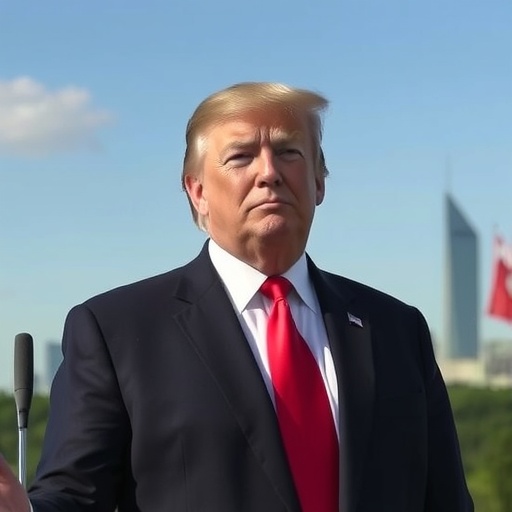Trump Abruptly Ends US-Canada Trade Negotiations Over Reagan-Infused Ontario Ad Slamming Tariffs
In a stunning escalation of transborder tensions, President Donald Trump has unilaterally terminated all ongoing trade negotiations with Canada, citing a provocative television advertisement aired by the Ontario government that features former President Ronald Reagan’s words to lambast U.S. tariffs. The move, announced via a fiery tweetstorm from the White House on Tuesday morning, comes just days before a pivotal Supreme Court hearing on the executive’s authority to impose such tariffs, sending shockwaves through North American markets and diplomatic circles.
Trump‘s decision marks a dramatic rupture in what had been a fragile détente between the two nations, long intertwined by the world’s largest bilateral trade relationship valued at over $600 billion annually. The ad in question, which debuted last week during prime-time broadcasts across Ontario, repurposes Reagan’s iconic 1980s rhetoric on free markets to decry Trump’s tariff policies as a betrayal of American conservative principles. “This isn’t just an ad; it’s an insult to our sovereignty,” Trump declared in a statement, vowing to protect U.S. interests against what he called “Canadian meddling in our politics.”
The fallout has already rippled through Wall Street, with the Canadian dollar plummeting 2.5% against the U.S. dollar in early trading and shares in export-heavy sectors like automotive and agriculture tumbling. Economists warn that a full breakdown in trade talks could cost both economies billions, exacerbating supply chain disruptions still lingering from the COVID-19 era.
The Ontario Ad That Ignited Trump’s Ire
The controversial advertisement, produced by Ontario’s Ministry of Economic Development, runs just 30 seconds but packs a punch with archival footage of Ronald Reagan delivering a 1988 speech from the Oval Office. In the clip, Reagan extols the virtues of open trade, stating, “Protectionism is destructionism,” a line now repurposed to critique Trump’s sweeping tariffs on Canadian steel, aluminum, and lumber—measures first imposed in 2018 under Section 232 of the Trade Expansion Act.
Narrated by a gravelly-voiced actor mimicking Reagan’s cadence, the ad transitions to modern scenes of shuttered Ontario factories and frustrated truckers at the Ambassador Bridge, a vital artery for cross-border commerce. “President Trump, remember your party’s hero: Tariffs aren’t the answer—they’re the problem,” the voiceover intones, ending with the provincial slogan, “Ontario: Building Bridges, Not Walls.” The spot has aired over 500 times in the past week, reaching an estimated 4 million viewers in the Greater Toronto Area alone, according to Nielsen ratings.
Ontario Premier Doug Ford, a vocal critic of Trump’s trade policies, defended the ad as a “truthful reminder of conservative values.” In a press conference in Toronto, Ford said, “We’re not attacking America; we’re appealing to its better angels. Reagan would be rolling in his grave seeing these tariffs hurt working families on both sides of the border.” The ad’s production cost a modest $250,000, funded through provincial tourism and economic promotion budgets, but its impact has been outsized, garnering millions of views on social media platforms like YouTube and TikTok.
Critics in Canada argue the ad is a savvy political maneuver ahead of provincial elections, blending economic advocacy with cultural nostalgia. U.S. conservative outlets, however, have decried it as foreign election interference, with Fox News host Sean Hannity labeling it “a cheap shot at the Gipper’s legacy.” The ad’s use of Reagan’s image without permission from the Ronald Reagan Presidential Foundation has also sparked legal murmurs, though experts doubt it violates fair use doctrines in political advertising.
Trump’s Immediate Backlash and Trade Negotiation Shutdown
President Trump’s response was as swift as it was unequivocal. Within hours of the ad’s viral spread, he fired off a series of posts on Truth Social: “Canada thinks they can use Reagan against me? Bad move! All trade negotiations ENDED effective immediately. Tariffs stay, and maybe more to come! #AmericaFirst.” By midday, White House Press Secretary Karine Jean-Pierre confirmed the administration’s directive to the U.S. Trade Representative’s office, halting talks on everything from dairy quotas under the USMCA to digital services taxes.
The terminated negotiations were part of broader efforts to revise the United States-Mexico-Canada Agreement (USMCA), which replaced NAFTA in 2020 after intense Trump-era haggling. Recent sessions in Ottawa had focused on resolving disputes over softwood lumber tariffs—levies that have cost Canadian producers over $1.5 billion since 2017, per the Canadian Wood Council—and automotive rules of origin. U.S. negotiators, led by Ambassador Katherine Tai, had made incremental progress on electric vehicle supply chains, but Trump’s order has frozen all progress.
Sources close to the administration reveal that internal memos had already flagged the ad as a “red line” during a National Security Council briefing last Friday. Trump’s tariff strategy, rooted in his “America First” doctrine, has imposed duties on $300 billion worth of imports since taking office, aiming to protect domestic industries but drawing rebukes from allies like Canada. In 2019 alone, these measures led to retaliatory Canadian tariffs on $12.6 billion of U.S. goods, including whiskey and ketchup, hitting red states hard.
Canadian Foreign Minister Mélanie Joly expressed shock in a statement from Ottawa: “This is an overreaction that harms ordinary citizens. Trade negotiations are about dialogue, not ultimatums.” Joly hinted at appealing to the World Trade Organization, where Canada has previously challenged U.S. tariffs and won partial victories.
Reagan’s Enduring Shadow in the US-Canada Tariff Wars
Ronald Reagan’s invocation in the Ontario ad isn’t mere theatrics; it taps into a deep vein of U.S. political history. The Gipper, a free-trade champion who negotiated the original Canada-U.S. Free Trade Agreement in 1988, embodied deregulation and open markets—philosophies that clash with Trump’s protectionist bent. Historians note that Reagan’s administration cut tariffs on thousands of goods, fostering the economic boom of the 1980s, while today’s disputes echo the Smoot-Hawley Tariff Act of 1930, which exacerbated the Great Depression.
Trump, who has long admired Reagan’s charisma but diverged on economics, once praised the 40th president as his “idol” during a 2015 campaign rally. Yet, in office, Trump’s tariffs have drawn fire from Reagan-era figures like former Commerce Secretary Malcolm Baldrige’s successors. The Reagan Foundation issued a mild rebuke, stating, “While we respect artistic expression, misusing the President’s words in partisan ads distorts his legacy of promoting prosperity through trade.”
Economists like those at the Peterson Institute for International Economics estimate that U.S. tariffs on Canada have reduced bilateral trade by 5-7% since 2018, costing 175,000 American jobs in export-dependent sectors. A 2023 study by the Fraser Institute in Canada pegged the total economic drag at $20 billion annually for both nations combined. Reagan’s own words, from his 1981 inaugural address—”Government is not the solution to our problem; government is the problem”—have been weaponized here to argue that tariffs represent overreach.
In interviews, trade experts underscore the irony: Canada, under leaders like Justin Trudeau, has positioned itself as a rules-based trader, contrasting Trump’s unilateralism. “Reagan built bridges with Canada; Trump is burning them,” quipped University of Toronto professor Wendy Dobson, author of “Tracks Across Borders: The Future of US-Canada Trade.”
Supreme Court Looms as Tariff Authority Battle Intensifies
The timing of Trump’s announcement couldn’t be more charged, arriving on the eve of oral arguments in United States v. Canadian Lumber Association, a Supreme Court case challenging the president’s tariff powers under the Constitution’s Commerce Clause. Set for Thursday, the hearing will examine whether executive actions like Section 232 tariffs infringe on Congress’s trade authority, with implications for all U.S. allies.
Legal scholars anticipate a divided court, with conservative justices like Clarence Thomas potentially siding with broad executive leeway, while liberals decry it as imperial overreach. Amicus briefs from the Canadian government and U.S. Chamber of Commerce urge restraint, citing how tariffs have inflated costs for American consumers by $50 billion yearly, according to the Tax Foundation.
Trump’s trade team, including USTR Tai, has defended the policies as national security imperatives, pointing to Canada’s alleged subsidies in sectors like aerospace. Yet, the Ontario ad has politicized the issue further, with Republican senators from border states like Maine and Michigan voicing concerns over retaliatory measures. Sen. Susan Collins (R-ME) tweeted, “Escalating over an ad risks our lobster and potato exports—let’s cool the rhetoric.”
Amid the legal drama, protests erupted in Detroit and Windsor, where auto workers fear job losses if USMCA revisions stall. The United Auto Workers union reported a 10% dip in cross-border shipments last quarter, blaming tariff uncertainty.
Economic Ripples and the Path Forward for US-Canada Ties
As markets reel, the broader implications for US-Canada relations are profound. With trade negotiations halted, sectors like energy—where Canada supplies 60% of U.S. crude oil imports—face uncertainty. The Keystone XL pipeline saga, revived under Trump but stalled by courts, could resurface as leverage, though environmental groups vow opposition.
Looking ahead, diplomatic backchannels may reopen through intermediaries like Mexico, co-signatory to USMCA. Prime Minister Trudeau has scheduled a call with Trump for next week, aiming to de-escalate. Analysts predict a potential compromise: Canada withdrawing the ad in exchange for tariff exemptions on critical minerals for EV batteries, vital for the green transition.
Yet, with midterm elections looming in the U.S. and provincial votes in Ontario, political posturing could prolong the standoff. The Conference Board of Canada forecasts a 0.5% GDP hit if talks remain frozen through 2024, while U.S. farmers eye lost markets for corn and soybeans. International observers, including the EU, watch warily, fearing a precedent for fractured alliances.
In this high-stakes game of economic chicken, the ghost of Reagan haunts the negotiations, reminding both sides of trade’s power to unite—or divide. As Trump doubles down on tariffs, Canada braces for a colder northern wind, with the Supreme Court’s ruling potentially tipping the scales toward reconciliation or rupture.








